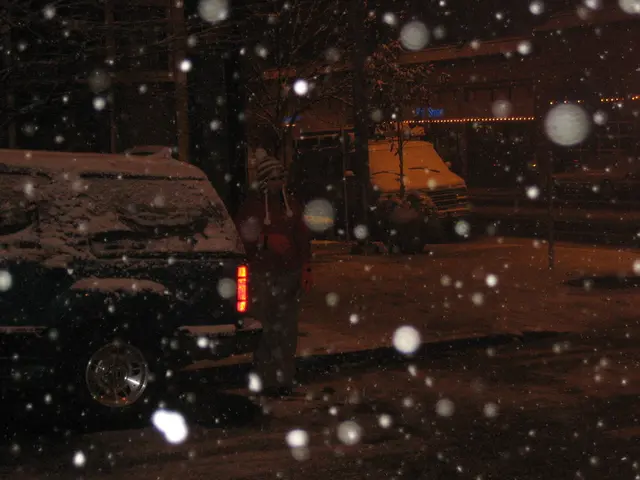International partners voice concern over Trump's proposed allowance for Russia to maintain control of vast territories it has annexed from Ukraine.
Bold Moves in Ukraine Peace Talks Spark Alarm Among US Allies
Tensions are simmering as the Trump administration pushes for a peace deal in Ukraine, a plan that has left our allies on edge. The stakes are high as diplomats from the US and Russia prepare to meet, with the possible outcome shifting Ukraine's border lines and questioning the foundations of international law.
The much-debated peace framework proposes some controversial demands from Ukraine, including the acceptance of Crimea as Russian territory, ceding large swaths of territory to Russia, and a freeze on the current border conflict. Vice President JD Vance recently voiced his support for freezing the territorial lines near their current positions.
When asked about Russia's proposed concessions, President Trump responded, "stopping the war" suggesting not advancing on the whole country is a significant compromise. Allied diplomats express worry over this proposal, as it sends a dangerous message to world leaders like Russia's Vladimir Putin and China's Xi Jinping that unlawful conquest could be rewarded.
A concerned Eastern European diplomat spoke to CNN, saying, "This is about the fundamental principles of international law. This is very much about our own existence and the weakening of any safeguards that my or other countries have for our own independence." They and other sources asked to remain anonymous to discuss sensitive diplomatic matters.
The plan to de facto recognize Crimea as part of Russia would contradict years of US policy affirming that, despite Russian occupation, Crimea remains Ukrainian territory. European officials suggest they would not follow suit, leaving the US isolated. Asian allies, too, express concern about an end to the conflict that favors Russia.
In private talks with US partners, Asian diplomats have voiced their concerns about the global implications of a settlement that disregards Ukraine's borders. "China is watching. We have told the Trump administration that. We are worried about the message they might take away from any end to the war that appears to award Russia for the bloodshed," said one Asian diplomat.
The attention now turns to the scheduled meeting between special envoy Steve Witkoff and Putin, which follows talks in London said to have progressed in discussions with European, Ukrainian, and US officials. Europeans fear that progress may not come fast enough to satisfy Trump's ambition for a swift end to the conflict.
Further concerns surround the kind of promises Putin may make to Witkoff to gain favor with the US, as European leaders caution that Putin cannot be trusted. Officials question the level of pressure that will be applied on Witkoff during his trip to Russia, considering the US's desire for a quick resolution to the war and Witkoff's history of echoing Putin's arguments.
Trump expressed dissatisfaction with Putin after a recent surge of missile strikes in Kyiv, saying that they were "not necessary, and very bad timing." However, the president has lashed out more fiercely at Ukraine's leader Volodymyr Zelensky than he has at Putin.
While the framework on the table has many allies highly worried, negotiations have shown progress in the high-stakes diplomatic talks this week, with significant advances made by Ukrainian representatives. However, the deal, if accepted by Zelensky, may not pass through the Ukrainian parliament.
Some diplomats note that there lacks a clear US strategy for implementing a potential deal, with Washington potentially charging past the idea of a ceasefire to merely end the conflict as soon as possible. The American position, according to a European official, is "take it or leave it, this is where we are." The Ukrainian position, the official added, is one of waiting for the terms of the agreement.
As diplomats work towards forming a permanent peace deal, questions remain about the true intentions behind the proposed framework. With allies expressing deep concern over its potential impact on international law and regional security, only time will tell if the proposed decisions will pave the way for a lasting peace or further disrupt the global order.
CNN's Fred Pleitgen contributed reporting.
Enrichment Data:
The proposed peace framework from the Trump administration aims to provide a permanent solution to the conflict between Ukraine and Russia by requiring Ukraine to make significant territorial concessions.
The key elements of the US plan involve:
- U.S. de jure recognition of Crimea as Russian territory, giving legitimacy to Russia's annexation of the peninsula.
- The de facto acceptance of Russian occupation over substantial areas of eastern and southern Ukraine, including nearly all of the Luhansk Oblast and parts of Donetsk, Kherson, and Zaporizhzhia regions.
- A freeze of the current front lines, roughly aligned with Russian territorial gains since 2022.
- Ukraine would receive security guarantees primarily backed by European countries rather than direct American military aid.
- Russia would benefit from the lifting of economic sanctions as part of the deal.
These territorial concessions and security arrangements are viewed by the US administration as a final offer to end the conflict, with urgency stressed to make a deal as soon as possible.
Many US allies and European nations have expressed strong reservations about this peace framework due to concerns over:
- The proposal's bias towards Russia and detriment to Ukraine's sovereignty, as it requires Ukraine to cede legally recognized territory to an aggressor.
- The undermining of fundamental principles of international law, as US recognition of Russia's annexation and occupation of Ukrainian territories sets a dangerous precedent that could embolden other countries.
- The possibility that such a deal would set a harmful precedent for regional security and the transatlantic alliance.
Allies worry that if any European country is forced to give up sovereign territory, it jeopardizes the security and independence of other countries in the region, including NATO members.
The concerns raised by U.S. and European allies emphasize the complexity of finding a peaceful solution to the conflict that respects Ukraine's territorial integrity and adheres to the principles of international law.
- The peace framework proposed by the Trump administration for Ukraine and Russia includes the recognition of Crimea as Russian territory, ceding significant territories to Russia, and a freeze on the current border conflict.
- Vice President JD Vance supports freezing territorial lines near their current positions, as stated in a recent debate.
- Allied diplomats are concerned that this peace proposal sends a dangerous message to world leaders, suggesting that unlawful conquest could be rewarded.
- European officials worry that US recognition of Crimea's annexation could set a harmful precedent for regional security and the transatlantic alliance.









